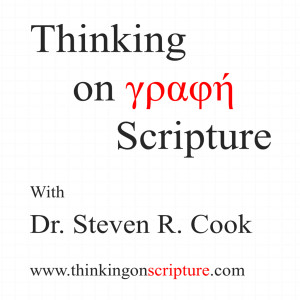
Thinking on Scripture with Dr. Steven R. Cook
Religion & Spirituality:Christianity

The main point of this pericope details Israel’s departure from Kadesh-barnea and the journey through the Transjordan which they conquered and partly settled. After the rebellion and defeat of the Israelites (Deut 1:1-46), the nation “circled Mount Seir for many days” (Deu 2:1b). This included the thirty-eight years of wilderness wandering which was God’s judgment upon the exodus generation of Israelites who rebelled against the Lord. God then ordered His people to “turn north” and begin to head toward the land of Canaan (Deut 2:3). This would have required them to pass through the territory of Edom to the east of Kadesh-barnea, and then north through the region of the Moabites and Ammonites. However, God did not permit the Israelites to harass the Edomites, Moabites, nor Ammonites, who were all descendants of Abraham and Lot, and therefore related to Israel physically and by covenant. Edom would be afraid of Israel (Deut 2:4), and God told His people not to consider their land for conquest, saying, “I will not give you any of their land, even as little as a footstep because I have given Mount Seir to Esau as a possession” (Deut 2:5). Israel was to treat them kindly, paying for any food or water they consumed in their territory (Deut 2:6). God had taken care of His people, Israel, saying, “For the LORD your God has blessed you in all that you have done; He has known your wanderings through this great wilderness. These forty years the LORD your God has been with you; you have not lacked a thing” (Deut 2:7). This was a continued sign of God’s logistical grace to meet their needs (cf. Deut 29:5). Three times God had declared “I have given” land to people other than Israel (Deut 2:5, 9, 19), and this demonstrates His sovereign control over the earth and His delegation of property to whoever He wishes (cf. Deut 32:8; 1 Ch 29:11-12; 2 Ch 20:5-7; Psa 24:1; 89:11; Dan 4:35; Acts 17:26). Israel passed through the land of Edom by circling around it “by the way of the wilderness of Moab” (Deut 2:8). Israel passed through Moab (Deut 2:9), a land once dominated by fierce people who were defeated by the Edomites (Deut 2:10-12). Moving further north, God told the Israelites to “arise and cross over the brook Zered yourselves” (Deut 2:13), which moved them into Ammonite territory. Moses then records the death of the first generation of Israelites since the exodus, and this marks a turning point in their history and advancement into the land of Canaan. This occurred after they had received their judgment of wandering for thirty-eight years, “until all the generation of the men of war perished from within the camp, as the LORD had sworn to them” (Deut 2:14). Those who died off were under God’s judgment, for “the hand of the LORD was against them, to destroy them from within the camp until they all perished” (Deut 2:15). After these people died (Deut 2:16), God instructed Moses to lead the people into the region of Ammon (Deut 2:17-18). Just like with the Edomites and Moabites, God instructed His people, saying, “When you come opposite the sons of Ammon, do not harass them nor provoke them, for I will not give you any of the land of the sons of Ammon as a possession, because I have given it to the sons of Lot as a possession” (Deut 2:19). The Moabites and Ammonites were not necessarily wonderful people; yet, God blessed them because of their relationship with Lot. We then learn about another people who formerly lived in that land and were called Rephaim, but the Ammonites called them Zamzummim (Deut 2:20), who were tall like the Anakim (Deut 2:21a). But great people are no match for the Lord, as we are told, “but the LORD destroyed them before them. And they dispossessed them and settled in their place, just as He did for the sons of Esau, who live in Seir, when He destroyed the Horites from before them; they dispossessed them and settled in their place even to this day” (Deut 2:21b-22). Lastly, we learn about another people called the Avvim, who were displaced by the Caphtorim, who were likely Philistines who migrated from Crete (Deut 2:23a), who “destroyed them and lived in their place” (Deut 2:23b). In all this, we see God’s sovereign hand of control to move people geographically and elevate some and destroy others, for the Lord owns and controls all land, and He determines who shall possess it as well as the means by which it is possessed.[1]
[1] Divinely approved acquisition of land may come as a gift, a purchase, or through military victory. When God’s people became corrupt, He expelled them by means of military defeat from their enemies. This happened when the ten northern tribes of Israel fell to the Assyrians in 722 BC and when the two southern tribes of Judah fell to the Babylonians in 586 BC.
More Episodes
 2021-08-21
2021-08-21
 40
40
 2021-08-07
2021-08-07
 54
54
 2021-08-07
2021-08-07
 40
40
 2021-08-01
2021-08-01
 39
39
 2021-07-31
2021-07-31
 41
41
 2021-07-25
2021-07-25
 70
70
 2021-07-24
2021-07-24
 43
43
 2021-07-18
2021-07-18
 57
57
 2021-07-17
2021-07-17
 31
31
 2021-07-14
2021-07-14
 45
45
 2021-07-11
2021-07-11
 41
41
 2021-07-10
2021-07-10
 73
73
 2021-06-27
2021-06-27
 37
37
 2021-06-27
2021-06-27
 57
57
 2021-06-26
2021-06-26
 64
64
 2021-06-13
2021-06-13
 46
46
 2021-06-13
2021-06-13
 38
38
 2021-06-12
2021-06-12
 66
66
 2021-06-06
2021-06-06
 44
44
 2021-06-05
2021-06-05
 55
55
Create your
podcast in
minutes
- Full-featured podcast site
- Unlimited storage and bandwidth
- Comprehensive podcast stats
- Distribute to Apple Podcasts, Spotify, and more
- Make money with your podcast
It is Free
- Privacy Policy
- Cookie Policy
- Terms of Use
- Consent Preferences
- Copyright © 2015-2024 Podbean.com





